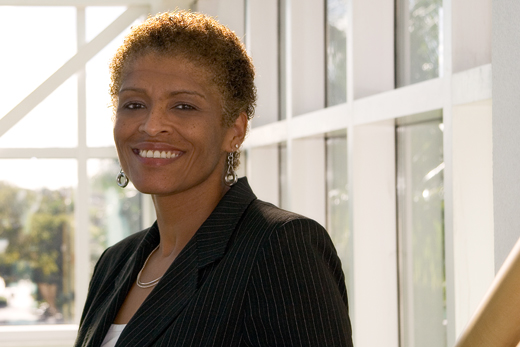It was while working in the graduate library at the University of Illinois at Urbana-Champaign that Yolanda Cooper felt her first stirrings around the idea of building a career within academic libraries.
She was a college student at the time, and though she'd grown up in a family that valued books and reading, there was something about the stately brick building, with its millions of volumes, special collections and cavernous reading rooms, that Cooper found especially inspiring.
She had arrived at a historic moment, as the library — one of the nation's largest university research libraries at the time — was just beginning to enter the world of automation, among the first university libraries in the U.S. to offer an online catalog.
And Cooper was deeply entrenched in the process. "I became involved in the migration from print holdings to automation — taking cards and turning them into computer records — as the libraries first developed that online catalog," recalls Cooper, who assumed her role as Emory's new university librarian in January.
Within her job, Cooper now oversees many facets of the Robert W. Woodruff Library and its affiliate branches, including areas of content, services, scholarly communications, campus and community affairs, and library administration, as well as the Manuscript, Archives and Rare Books Library (MARBL).
She came to Emory amid a wave of change — from ongoing teaching and technological innovations around digital scholarship to physical renovations within MARBL and the Woodruff Library tower, as well as the development of a new, shared library service center between Emory and Georgia Institute of Technology, now under construction on the Briarcliff property.
But those are the very challenges that keep Cooper excited about her work.
"Everything libraries do at this point is so closely connected to technological growth and that has continued to explode, especially over the last few years," she says. "For libraries, the possibilities are endless."
The digital age of libraries
If not the soul of a campus, a university research library may well be its heart, maintaining the flow of information and research; encouraging learning, discourse and discovery; and supporting the health and vigor of an intellectual community.
"I was drawn to the diversity of the work," Cooper explains. "Libraries touch upon any number of disciplines across all areas, and you're constantly learning and growing, and that was fascinating to me."
"We're helping faculty, students, staff and even the public dig out information while teaching them to navigate the digital deluge by building information literacy skills," she adds. "It just opens the door to so many individuals and audiences."
Throughout her career, Cooper has been drawn to the rapidly changing role of technology within the field of library science. "I found myself loving the systems that were developed to automate the material and make it more available and discoverable," she recalls.
"I even did a little programming along the way, and that may have something to do with my fit here at Emory — a lover of the traditional library, but keeping my interest in technology and not being afraid of that piece."
The lure of special collections
Cooper comes to Emory with 25 years of administrative experience in university libraries across five research library systems.
They include the University of Illinois graduate and undergraduate libraries, the University of Northern Colorado's Michener Library, Indiana University in Bloomington, the University of Virginia library system, and most recently, the University of Miami Libraries, where Cooper served as librarian associate professor, deputy university librarian and acting dean and university librarian.
Along the way, she developed a particular interest in special collections. So it was little surprise that Emory's MARBL would prove an especially strong lure.
"When I went to Miami, my world opened up — because of my responsibilities, I entered into the special collections arena," she explains. "Emory left a lasting impression due, in part, to its own special collections, which I had the chance to view in 2004 when I came here to attend the FRYE Leadership Institute."
Through MARBL, Cooper began to appreciate the full depth of the university's collections and the scope of its scholarship. "Emory was known as an innovator," she says. "Within the Association of Research Libraries, this is a highly ranked school, very well respected and a model for innovation."
As she returned to visit Emory over the years, Cooper became interested in tracking the new models of digital scholarship and teaching technologies that she saw unfolding.
Through MARBL, and efforts to digitize its collections, she envisions rich opportunities "to expand our reach, so that a regional collection may become a global resource."
What's on the horizon?
Students returning to campus for fall semester will see signs of ongoing library improvements, including a revamped next-generation Digital Learning Commons on the second floor of Woodruff Library. The MARBL renovation on the 10th floor of the Woodruff Library Tower is also under way, creating new classroom, seminar, conference, exhibit and reading room spaces.
Cooper's other priorities include appointing a new undergraduate/graduate student advisory committee to explore the creation of new student spaces, especially those that could meet the particular needs of graduate students, as well as managing growth and developing services to ensure that Emory libraries offer resources most pertinent to the campus as a world-class research university.

